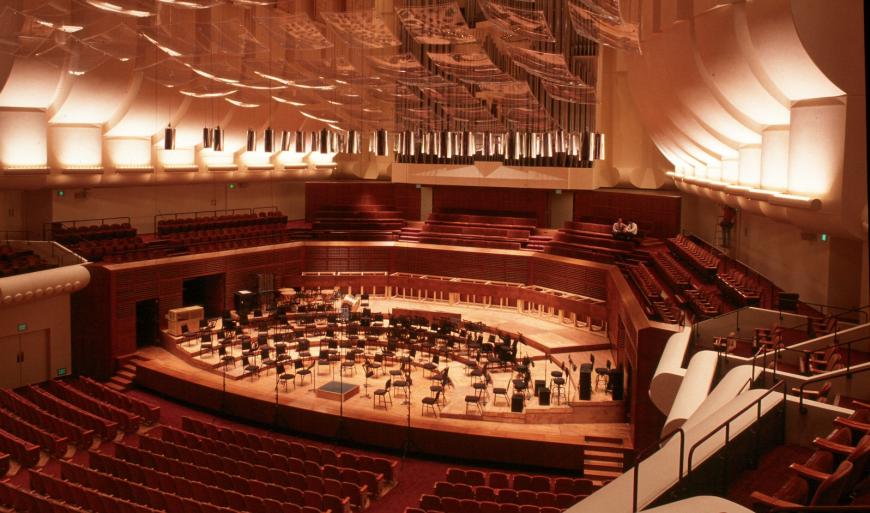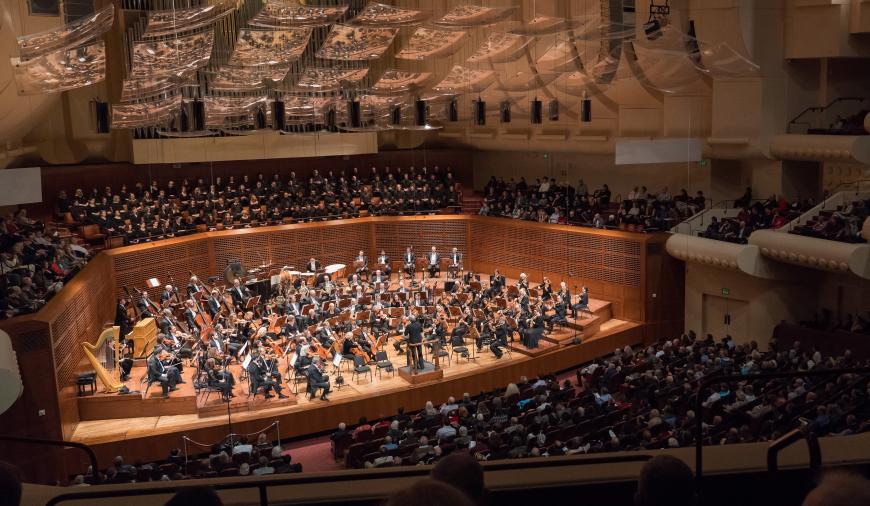
Trouble is brewing at the San Francisco Symphony over collective bargaining contracts. A clash over the SF Symphony Chorus’s contract, which expires on July 31, bodes ill for what will happen with negotiations over the orchestra’s contract (the current extension is in force through Nov. 18).
The problem became public on Thursday when the SFS Chorus’s union representative, the American Guild of Musical Artists (AGMA), released a statement from the singers, saying that “management has proposed slashing the [SFS] Chorus budget by 80 percent.”
Extreme demands by both labor and management are usual as a kind of opening gambit, but this negotiation is close to its final phase, just a couple of weeks ahead of the current contract’s expiration.
The stunning development — not denied by management — is that the SFS Chorus’s 32 paid singers would each receive $4,324 for all season services in 2024–2025, down from the current salary of $21,621.06, which covers 26 performances and 56 rehearsals (82 services).
A comparison to put these numbers in perspective: If we figure that each service is three hours, management’s proposal would reduce hourly compensation to $17.57 — barely above the California minimum wage of $16 per hour and below the $20-per-hour minimum salary for fast-food restaurant employees in the state. Of course, singers’ preparation time at home and their years of training are impossible to account for in compensation figures.
According to an AGMA spokesperson, the SF Symphony aims to reduce how often AGMA choristers work with the orchestra, which effectively reduces total income but is different from the minimum-wage model described above.

The SF Symphony’s history of negotiations with its employees has had its ups and downs. There have been several orchestra strikes over the past several decades, but then, under the leadership of Mark C. Hanson as CEO and Sakurako Fisher as president of the board of directors, it was smooth sailing, with contracts signed well in advance of expiration.
Amid the recovery from the pandemic lockdown and with the Symphony under new management, there came an unprecedented standoff in 2022–2023, the orchestra working over 300 days without a contract until settling reluctantly for a one-year extension. In the post-COVID years, the Symphony’s finances have become a matter of controversy.
The choristers refer to the ongoing conflict in the organization by saying that “the chorus accounts for a little over 1 percent of the overall budget and is vital in attracting audiences and donors. Simply put, ticket sales are higher when we are singing. The financial rationale for such severe cuts simply doesn’t add up.
“The Symphony has informed us that it projects a $12.5 million budget deficit for the next fiscal year. Putting aside the assumption that this deficit must be solved only through cuts rather than improved fundraising or patron development, cutting $800,000 of the [SFS] Chorus’s roughly $1 million cost won’t cover this. Cutting 80 percent of [the organization’s] approximately $75 million in expenses across the board would save nearly $60 million, indicating these cuts unreasonably target the [SFS] Chorus.”

Responding to a question about Thursday’s AGMA release, the SF Symphony’s chief marketing and communications officer told SF Classical Voice:
“Our chorus is an essential part of the [SF] Symphony, and we are engaged in good-faith negotiations to reach an acceptable outcome for both sides. We met with our AGMA union partners as recently as today and have had productive conversations, with more touch points to come.
“During those meetings and prior, we’ve been transparent about the challenging financial pressures we face — like many other arts organizations since the pandemic. We are working with union representatives to collectively address those realities. Out of respect for the negotiating process we won’t be providing specifics about the details of talks at this time.”
As context for that statement, this is the Symphony’s own description of the SFS Chorus:
“One of America’s most distinguished choruses, the 152-member San Francisco Symphony Chorus [celebrated] its 50th anniversary during the 2023–2024 season. In September 2023, Music Director Esa-Pekka Salonen and the [SF] Symphony announced Jenny Wong as the [SFS] Chorus’s next director.
“Known for its precision, power, and versatility, the SF Symphony Chorus performs more than 26 concerts each season and is comprised of 32 professional and 120 non-professional members.
“Recordings featuring the SF Symphony Chorus have won a total of eight Grammy awards, including three for Best Choral Performance. SFS Media’s recording of [Gustav] Mahler’s Symphony No. 8 with [Michael] Tilson Thomas and the SF Symphony and Chorus won three 2010 Grammys, including the award for Best Choral Performance.”
The singers’ response to the threat of an 80 percent reduction: “There are smarter, less damaging ways to address financial issues without undermining our chorus or further exploiting unpaid talent. A more transparent approach to the Symphony’s finances and strategic use of the endowment is essential.
“Our goal is not just to save our union jobs but also to ensure the Symphony continues to thrive artistically. The Symphony Chorus is one of few union choral jobs in the Bay Area, and yet many of us must juggle multiple jobs to survive in this city as working musicians. The Symphony’s proposal to reduce our guaranteed work will be financially devastating to the dwindling number of union choristers in the city and make it more difficult to keep artistic talent in the Bay.”




